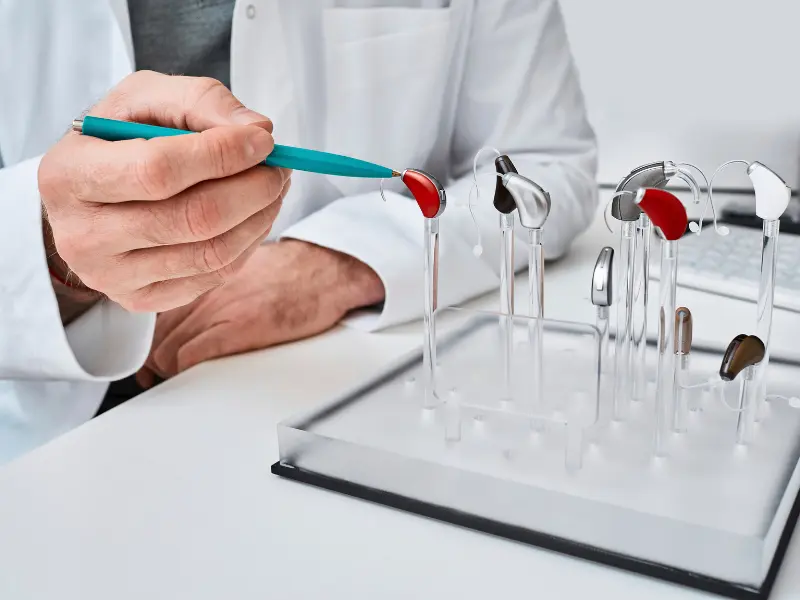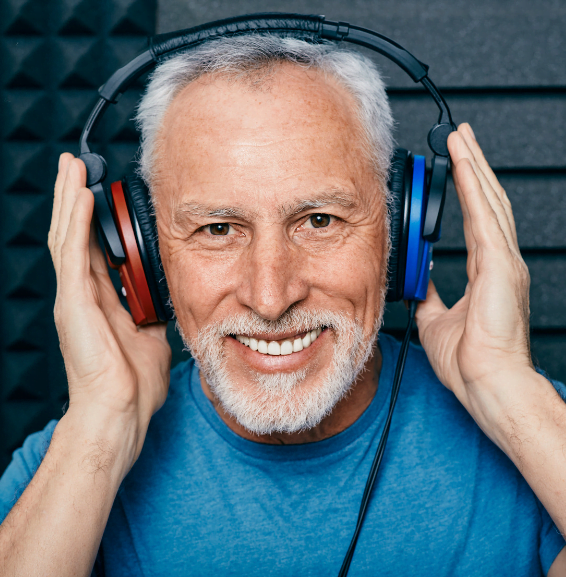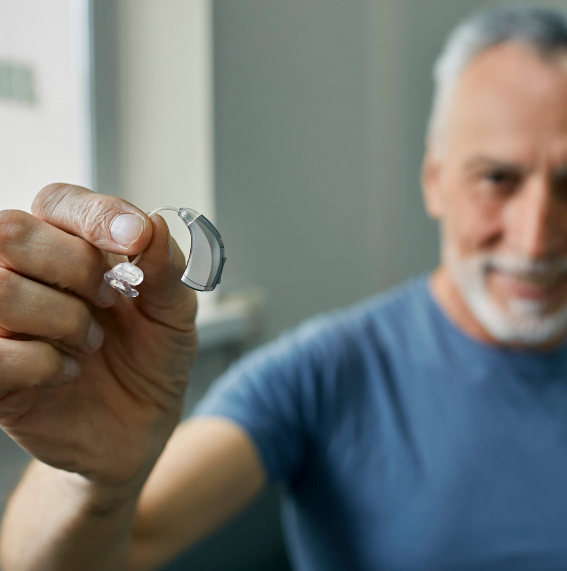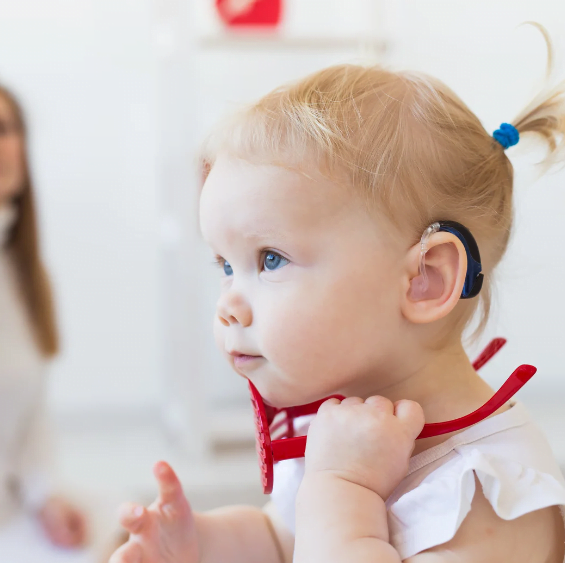CAUSES OF HEARING LOSS
Hearing Loss Can Stem From Aging, Noise, Or Medical Issues. Identifying The Cause Is Crucial For Treatment.
CAUSES OF HEARING LOSS
Hearing loss can stem from aging, noise, or medical issues. Identifying the cause is crucial for treatment.

CAUSES OF HEARING LOSS
Hearing loss can stem from aging, noise, or medical issues. Identifying the cause is crucial for treatment.

Hearing loss in adults can result from several common factors, such as:
- Aging
- Excessive noise exposure
- Injury
- Viral infections like measles or mumps
- Ear wax build-up
- Ototoxic medications that can damage hearing
- Genetics
Since hearing loss can occur at any stage of life, it’s important to have your hearing evaluated by one of our hearing care experts, regardless of the cause.

Hearing loss in adults can result from several common factors, such as:
- Aging
- Excessive noise exposure
- Injury
- Viral infections like measles or mumps
- Ear wax build-up
- Ototoxic medications that can damage hearing
- Genetics
Since hearing loss can occur at any stage of life, it’s important to have your hearing evaluated by one of our hearing care experts, regardless of the cause.
Age-related hearing loss (presbycusis)
Age is the single biggest cause of hearing loss, as changes in the inner ear naturally occur as we grow older. Genes and loud noise exposure also play significant roles. When your hearing starts to weaken, it becomes more difficult to:
- Hear soft voices
- Hear high-frequency sounds (such as the voices of children and women)
- Follow conversations when there’s background noise
Because the loss is gradual, you may not realize that you’ve lost some of your hearing ability.


Age-related hearing loss (presbycusis)
Age is the single biggest cause of hearing loss, as changes in the inner ear naturally occur as we grow older. Genes and loud noise exposure also play significant roles. When your hearing starts to weaken, it becomes more difficult to:
- Hear soft voices
- Hear high-frequency sounds (such as the voices of children and women)
- Follow conversations when there’s background noise
Because the loss is gradual, you may not realize that you’ve lost some of your hearing ability.

Noise-induced hearing loss
Repeated exposure to high levels of noise is a frequent cause of hearing loss. Prolonged exposure to loud sounds can damage the sensitive hair cells in the inner ear, impacting your ability to hear clearly.
Certain individuals are at higher risk of developing noise-induced hearing loss, especially those in noisy work environments such as military personnel or musicians. Listening to excessively loud music at live concerts or through headphones can also lead to hearing damage. Taking preventive measures can help protect your hearing.

Noise-induced hearing loss
Repeated exposure to high levels of noise is a frequent cause of hearing loss. Prolonged exposure to loud sounds can damage the sensitive hair cells in the inner ear, impacting your ability to hear clearly.
Certain individuals are at higher risk of developing noise-induced hearing loss, especially those in noisy work environments such as military personnel or musicians. Listening to excessively loud music at live concerts or through headphones can also lead to hearing damage. Taking preventive measures can help protect your hearing.
Congenital hearing loss
Congenital hearing loss refers to hearing difficulties that are present at birth. This type of hearing loss can be caused by genetic defects, infections during pregnancy, or low birth weight. While it is relatively rare compared to other causes of hearing loss, affecting less than 1% of babies, it is still a significant condition that requires attention.


Congenital hearing loss
Congenital hearing loss refers to hearing difficulties that are present at birth. This type of hearing loss can be caused by genetic defects, infections during pregnancy, or low birth weight. While it is relatively rare compared to other causes of hearing loss, affecting less than 1% of babies, it is still a significant condition that requires attention.
Take care of your hearing by minimizing exposure to loud sounds whenever possible. If you can’t avoid noisy environments, use high-quality earplugs or earmuffs to protect your ears.

Loud background noise
An environment where you have to raise your voice significantly to be heard over the background noise.

Industrial Noise
Environments where noise is so intense it causes discomfort such as at a concert scene with high sound levels.

Live Music
Concerts or festivals where sound levels are significantly higher than typical, posing a risk to hearing health.
Take care of your hearing by minimizing exposure to loud sounds whenever possible. If you can’t avoid noisy environments, use high-quality earplugs or earmuffs to protect your ears.

Loud background noise
An environment where you have to raise your voice significantly to be heard over the background noise.

Industrial Noise
Environments where noise is so intense it causes discomfort such as at a concert scene with high sound levels.

Live Music
Concerts or festivals where sound levels are significantly higher than typical, posing a risk to hearing health.
Take care of your hearing by minimizing exposure to loud sounds whenever possible. If you can’t avoid noisy environments, use high-quality earplugs or earmuffs to protect your ears.

Loud background noise
An environment where you have to raise your voice significantly to be heard over the background noise.

Industrial Noise
Environments where noise is so intense it causes discomfort such as at a concert scene with high sound levels.

Live Music
Concerts or festivals where sound levels are significantly higher than typical, posing a risk to hearing health.
Did you know?
FAQS CAUSES OF HEARING LOSS
Hearing loss can be caused by several factors including aging (presbycusis), excessive noise exposure, genetic factors, ear infections, ototoxic medications, and buildup of earwax. It can also result from injuries or underlying medical conditions.
As people age, the hair cells in the inner ear can become damaged or degenerate, leading to a gradual loss of hearing ability. This type of hearing loss, known as presbycusis, typically affects the ability to hear high-frequency sounds and understand speech in noisy environments.
Yes, prolonged or repeated exposure to loud noises can damage the sensitive hair cells in the inner ear, leading to permanent hearing loss. This type of hearing loss is known as noise-induced hearing loss and can occur in environments such as concerts, industrial settings, or through prolonged use of loud headphones.
Yes, certain viral or bacterial infections can lead to hearing loss. For example, infections like measles, mumps, and meningitis can damage the auditory system. Ear infections, particularly chronic ones, can also impact hearing.
Hearing loss can indeed be hereditary. Genetic factors can cause congenital hearing loss, where a baby is born with hearing difficulties, or it can develop later in life due to inherited conditions that affect hearing. It’s important to consider family history when assessing the risk of hearing loss.





